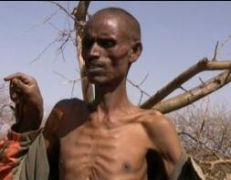PR-Inside.com
Monday, September 22, 2008
 |
|
The living skeleton of a Somali man in Ogaden |
Human Rights Watch reports atrocities, systematic abuse and violations to dehumanise Somalis in Ethiopia. Somali tribal elders also report campaigns of terror deliberately set to drive them out and starve as the Ethiopian regime considers them “threat” to peace (Ethiopian government often uses the term “anti-peace” to describe foes).
United Nations Humanitarian chief, John Holmes visited the city of Jigjiga this week now the capital city of Somali region in Ethiopia and one of the biggest Ethiopian military camp in the region. Travelling with aid convoys, he saw desperate villagers living in small domed huts facing hunger and malnutrition.
Traumatised and desperate
Britain’s Channel 4 confirmed the dire sequence of events in Ethiopia’s ethnic Somali regions. Pictures of traumatised and dazed mother with her children crying of hunger and her inability to feed her four children touched many. Elders often miss meals to feed their young offspring. An older man struggled to protest against Ethiopia as he barely could lean his skeleton body on a thorny tree. There was no food or medicine in sight the correspondent declared.
For the first time in history, the Somali people in today’s Ogaden home to the rich Somali independent pastoral traditions and abundance of meat and milk lost it’s glorious face forcing many to become beggars or living on eating dead leaves and tree barks. Many villages in Ogaden now live in similar conditions. Although many Somalis are grateful to assistance, and natural born survivors, their plight today explains much of the broken social fabric which had been a policy of the Ethiopian government to fight and marginalise Somali “nomads”.
As many villagers were forced or abandon their settlements, dusty cities such as Jigjiga become a place of opportunity to save themselves from misery. Those too proud to beg, entered into prostitution with the added risk of diseases such as HIV and AIDS. As most cities are frequented by the marauding Ethiopian soldiers as the only regular income earners, women fall victim to such seedy trade in order to survive.
Suffering in silence
Isolated by the Ethiopian government, Somali elders whose knowledge is imperative to combat such devastating starvation claim diversions of food aid. “the only people who eat are the military” said one elder.
Before this current devastation, Somalis in Ethiopia survived by trade with Somalia and Somaliland. However, with the ban on Somali livestock by Arab countries such as Saudi Arabia, many faced hardship often loosing crucial investments in livestock which was their economic backbone. To add insult to their injuries, Ethiopian backed paramilitaries destroyed the regions relations with Somalia and Somaliland by burning trucks and goods designated to Ogaden supplying essential goods such as sorghum, wheat, animal fodder and cooking oil. As a result, trucks from Somalia and Somaliland avoid entering Ethiopia in fear of molestation.
The only supply route the UN has is through the unfriendly and hostile environment of Ethiopian controlled districts such as Jigjiga. Many UN staff are crudely awaken by the endless requests of “travel permissions” to travel into each settlements. Without these “travel permissions”, no place can be visited. As one elder said, “we live in a prison and we have no friends, thus suffer alone”.
The latest to fall victim to Ethiopian forces is an IRC (International Rescue Committee) employee called Kamal Keit from Nepal. He was apparently arrested for over staying “his tenure” in the village of Dig after a water sanitation project assignment took longer than expected, Kemal is sadly under arrest.
Fridays no more holy days in Ogaden
Ethiopian regime’s president Meles Zenawi denied rights abuses and continues to enjoy USA support for his apparent “war on terror”. For a country whose value to Al-Qaeda is difficult to comprehend, Ethiopia is currently involved in an imaginary war with “Islamic extremism”. This despite the absence of any Islamic militancy within Ethiopia as Christians enjoy military and political dominance over its Muslim constituencies.
The latest grief for Somalis was the confirmation of Ethiopian administration to designate Fridays as a working day. Friday is similar to Sabbath and Sunday for Muslims as they consider it a holy day. This loss of religious right has become the latest denial of rights to Muslim Somalis. Somali experts cite an increasing fear of the regime afraid of Muslim gatherings and sermons as the rising tension could spark demonstration in cities such as Jigjiga.
Unlike in Nigeria’s ethnic federalism, Ethiopia’s ethnic federalism is still abused by a central government preferring obsessive control over the lives of its people than accommodating freedom. After dawn everyday, curfews are brought in Somali towns and cities as the streets are crowded by military vehicles and soldiers. A hotel owner in Dhegahbuur town called Ahmad Nasir said: ” we sleep early in fear, and yet are awake all night fearing a knock on the door by the soldiers”. The Ethiopian army is notorious for forcefully conscripting men and children as they are dragged from their houses in the middle of the night.